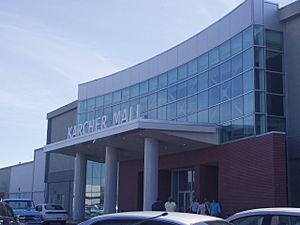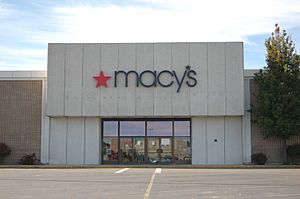Karcher Marketplace facts for kids

The main entrance in 2006
|
|
| Location | Nampa, Idaho, United States |
|---|---|
| Coordinates | 43°36′05″N 116°36′04″W / 43.601279°N 116.601076°W |
| Opening date | August 26, 1965 |
| Developer | Max Boesiger |
| Owner | Rhino Investments |
| No. of anchor tenants | 4 |
| Total retail floor area | 400,000 square feet (37,000 m2) |
| No. of floors | 1 |
Karcher Marketplace, once known as Karcher Mall, is a big shopping center in Nampa, Idaho, United States. It first opened its doors in August 1965. Back then, it was an enclosed shopping mall with popular stores like Buttrey Food & Drug, Tempo, and Sprouse-Reitz. For a while, it was the biggest shopping mall in the Treasure Valley area. That changed when Boise Towne Square opened in Boise in October 1988. Today, Karcher Marketplace has stores like Big 5 Sporting Goods, Jo-Ann Fabrics and Crafts, Mor Furniture, and Ross.
In 2019, a company called Rhino Investments bought the mall. They started a big project to make it new again. This included tearing down about 81,000 square feet (7,500 m2) of the mall's space. The plans for the future include adding more new stores and even some apartment buildings.
Contents
The Story of Karcher Marketplace
Construction on the mall began in 1963. It was built on what used to be an alfalfa field. The mall officially opened on August 26, 1965. Its first main stores were Buttrey Food & Drug, Tempo, and Sprouse-Reitz.
In 1967, another big store, JCPenney, decided to open a location at the mall. This led to a large expansion project. The mall grew by 259,000 square feet (24,100 m2) of new shopping space. This new area included the two-level JCPenney store and a Skaggs Drug Centers store. After the new JCPenney opened, the company closed four smaller stores in nearby towns.
The mall grew even more in August 1973. Two more department stores, Falk's I.D. Store and The Bon Marché, joined the mall. A two-screen movie theater, Karcher Twin Theaters, also opened. In 1976, an Ernst hardware store was added nearby. By 1986, Karcher Mall had 74 businesses. It was sold to Standard Management Co. for about $14 million. Around the same time, Falk's I.D. Store closed all its locations. The mall's Falk's store became an Anthony's store. In 1987, the mall got a $1 million makeover.
Changes and Challenges
In October 1988, a new, larger mall called Boise Towne Square opened in Boise. This was a big challenge for Karcher Mall. JCPenney, one of Karcher Mall's biggest stores, moved to the new Boise mall. Karcher Mall quickly found a new store, Troutman's Emporium, to take over the lower level of the old JCPenney space. The upper level was used for storage. In 1990, Sears also moved its store to Karcher Mall, though it only sold appliances and garden equipment. By 1993, Karcher Mall still had over 70 stores.
During the 1990s, Karcher Mall lost several main stores. These included PayLess Drug, Ernst, Woolworth, and The Hub Clothing. In May 1998, new owners, Karcher Partners LLC, bought the mall. They announced a $10 million renovation project in 1999. This makeover included new storefronts, better lighting, and a new main entrance. During this time, new stores like Jo-Ann Fabrics & Crafts and Liquidation World moved in.
Even with the big renovations, the mall continued to lose stores and customers. The mall's movie theater closed in 2000. Sears also moved out in 2001 to a new shopping center nearby.
In 2003, Emporium, the mall's largest store, had to close. This was because its parent company faced financial problems. Big stores like Costco and Home Depot were interested in the space, but they had different ideas for the mall. Soon after Emporium closed, Big 5 Sporting Goods and Ross Dress for Less opened. However, these new stores did not have entrances directly into the mall. By March 2004, a large part of the mall was empty.
New Owners and a Fresh Look
In 2004, Karcher Mall was sold to LB Nampa Mall Holdings LLC. They hired a company to help manage the mall and attract new stores. The mall was sold again in 2005 to Baum Bros. LLC, and then again to Milan Properties LLC. Milan Properties planned to update the mall and fill the empty Emporium space. They hoped that new roads and nearby shopping centers would bring more people to the mall.
In 2007, Burlington Coat Factory opened in the old Emporium space. This was a big new store for the renovated mall. In 2008, a clothing store called Steve & Barry's opened, but it closed just 11 months later.
Also in 2008, Macy's announced it would close its Karcher Mall store. Macy's had been at the mall for a long time, first as The Bon Marché. It moved to the new Nampa Gateway Center in late 2009. In 2009, a new movie theater and restaurant, Northern Light Cinema Grill, opened in the old theater building. In 2014, Macy's also closed its clearance center at the mall.
In 2016, a new Mor Furniture store opened in the space Macy's had left. In 2018, Burlington also moved out to a new location. In recent years, the mall had problems with maintenance and high rent. This caused many stores to leave.
The 2019 Renovation
In May 2019, Rhino Investments bought the mall. In July 2019, they shared plans for a big renovation. This project included tearing down about 81,000 square feet (7,500 m2) of the mall. The plans also included adding new stores and nine apartment buildings with 216 apartments. Some of the current stores, like Big 5 Sporting Goods, Jo-Ann Fabrics, Mor Furniture, and Ross, will stay.
Construction for the newly named Karcher Marketplace began in November 2019. However, the work was paused in early 2020 because of the COVID-19 pandemic.
 | Leon Lynch |
 | Milton P. Webster |
 | Ferdinand Smith |


